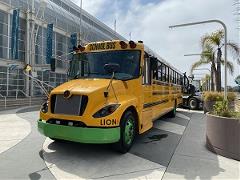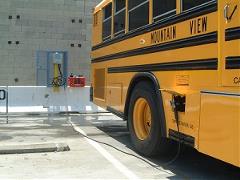 Overview:
Overview:
California Assembly Bill 181 requires school districts to develop transportation service plans in consultation with air quality management districts. South Coast AQMD does not review these plans; however, we do offer several funding programs that school districts may take advantage of when implementing their plans.
requires school districts to develop transportation service plans in consultation with air quality management districts. South Coast AQMD does not review these plans; however, we do offer several funding programs that school districts may take advantage of when implementing their plans.
School districts can use the following information to address air quality issues that may arise during their planning process. Potentially applicable requirements for school districts, and available incentive funding are discussed below. In addition to the regulations and incentives discussed here, please also see South Coast AQMD’s guidance specific to school sites (PDF).
Potentially applicable rules:
-
South Coast AQMD Rule 1195 - Rule 1195 applies to public and private school bus fleets under contract with state or local public entities with 15 or more school buses operating within the South Coast AQMD jurisdiction. Under the Rule, school buses can be classified as either Type A, B, C, or D, which range from medium-duty 10-passenger vans to heavy-duty vehicles that are capable of transporting 72 or more passengers (please refer to Rule 1195 for definitions of school bus types). Rule 1195 requires affected school bus fleet operators to purchase:
-
Ultra-Low Emission Vehicle (ULEV) standard or cleaner non-diesel powered school buses for newly manufactured Type A or B school buses (for pre-owned, Low Emission Vehicle standard school buses are also allowed); or
-
Alternative-fueled school buses, including natural gas, propane, battery electric, and fuel cell school buses, for newly manufactured Type B, C or D school buses (for pre-owned, repowered school buses with an alternative-fueled engine are also allowed).
-
Rule 1195 also provides limited exemptions upon approval by South Coast AQMD. For an exemption, fleet operators would need to submit an Exemption Request (PDF) with appropriate documentation to South Coast AQMD for approval. For more information about Rule 1195, please contact fleet rules staff at fleetrules@aqmd.gov or (909) 396-3044.
-
California Air Resources Board (CARB) Air Toxics Control Measure on School Bus Idling - This regulation limits school bus idling and idling at or near schools to only when necessary for safety or operational concerns. The program targets school buses, school pupil activity buses, youth buses, paratransit vehicles, transit buses, and heavy-duty commercial motor vehicles that operate at or near schools. Additional information about this regulation is available on CARB’s website.
limits school bus idling and idling at or near schools to only when necessary for safety or operational concerns. The program targets school buses, school pupil activity buses, youth buses, paratransit vehicles, transit buses, and heavy-duty commercial motor vehicles that operate at or near schools. Additional information about this regulation is available on CARB’s website.
-
CARB Truck and Bus Regulation - The Truck and Bus regulation requires all diesel-fueled school buses with a gross vehicle weight rating (GVWR) over 14,000 pounds be equipped with a Level 3 PM filter, or an original equipment manufactured PM filter that most commonly comes installed on 2007 model year and newer engines. Please refer to CARB’s fact sheet
requires all diesel-fueled school buses with a gross vehicle weight rating (GVWR) over 14,000 pounds be equipped with a Level 3 PM filter, or an original equipment manufactured PM filter that most commonly comes installed on 2007 model year and newer engines. Please refer to CARB’s fact sheet (PDF) for more information on compliance requirements for school buses subject to this rule.
(PDF) for more information on compliance requirements for school buses subject to this rule.
Potentially Available Funding:
-
South Coast AQMD Lower-Emission School Bus Program - Since 2001, South Coast AQMD has implemented the Lower-Emission School Bus Program (LESBP) and replaced over 1,800 high-polluting diesel school buses with alternative fuel or zero-emission buses. South Coast AQMD provides funding for public school districts and joint power authorities to replace Type A, C or D school buses with a gross vehicle weight rating (GVWR) greater than 14,000 lbs. The LESBP has provided clean, safe transportation for school children and reduced their exposure to criteria pollutants and toxic diesel particulate matter emissions. South Coast AQMD anticipates funding for the LESBP to continue in Fall 2023. For additional information, please visit our Lower-Emission School Bus Program school bus page at www.aqmd.gov/schoolbus or email us at schoolbusprogram@aqmd.gov.
-
Federal Clean School Bus Program - U.S. EPA is providing funding from the Bipartisan Infrastructure Law through its new Clean School Bus Program. This program will provide $5 billion over the next five years (FY 2022-2026) to replace existing school buses with zero-emission and low-emission models. EPA solicited rebate applications for $500 million through the 2022 Clean School Bus Rebates for zero-emission and low-emission school bus rebates as the first funding opportunity, and subsequent funding opportunities are expected in the future. More information is available on U.S. EPA’s website .
.
Additional Funding Programs
Other funding programs may also be available for school districts to use for their transportation programs:
